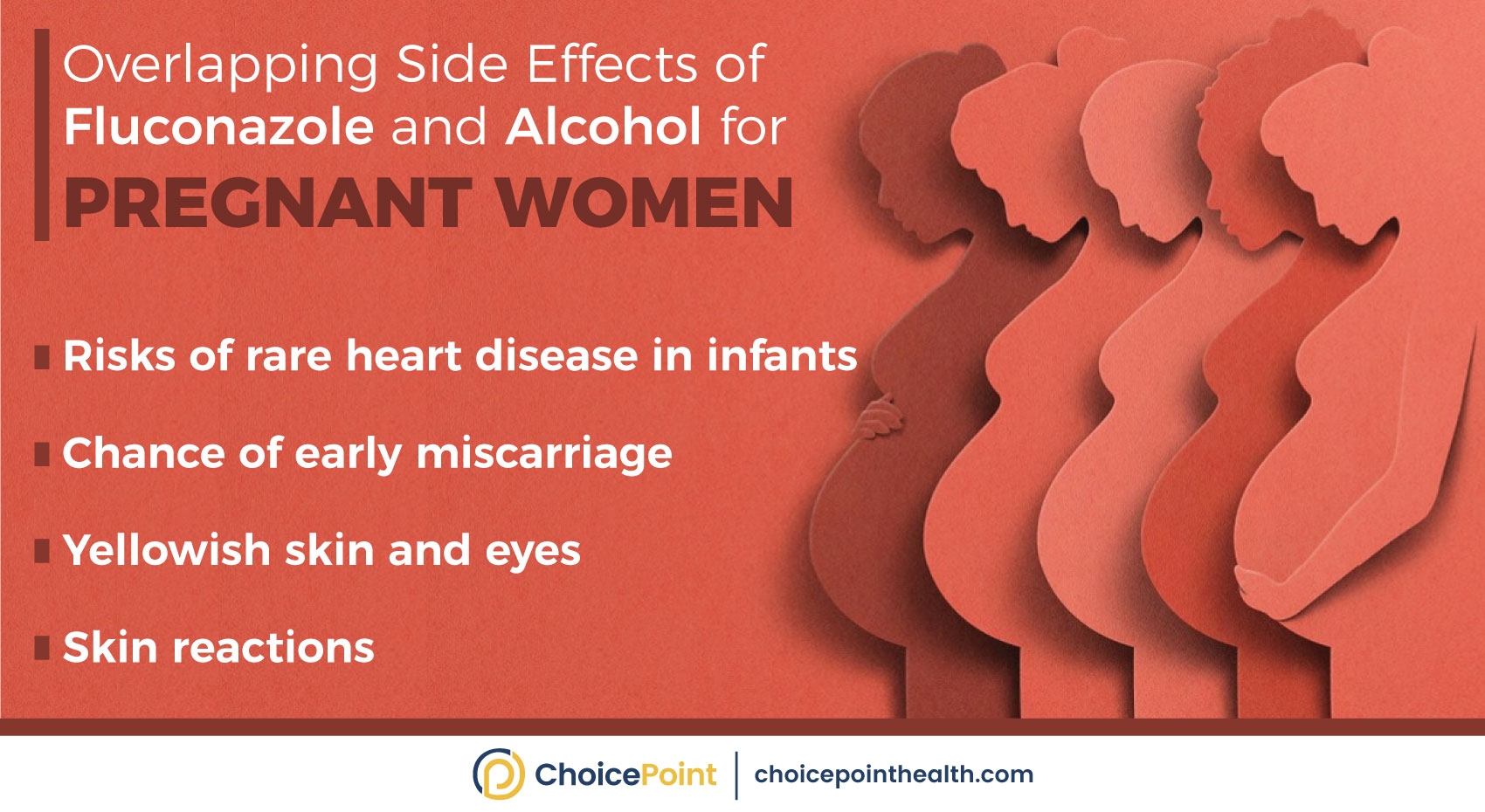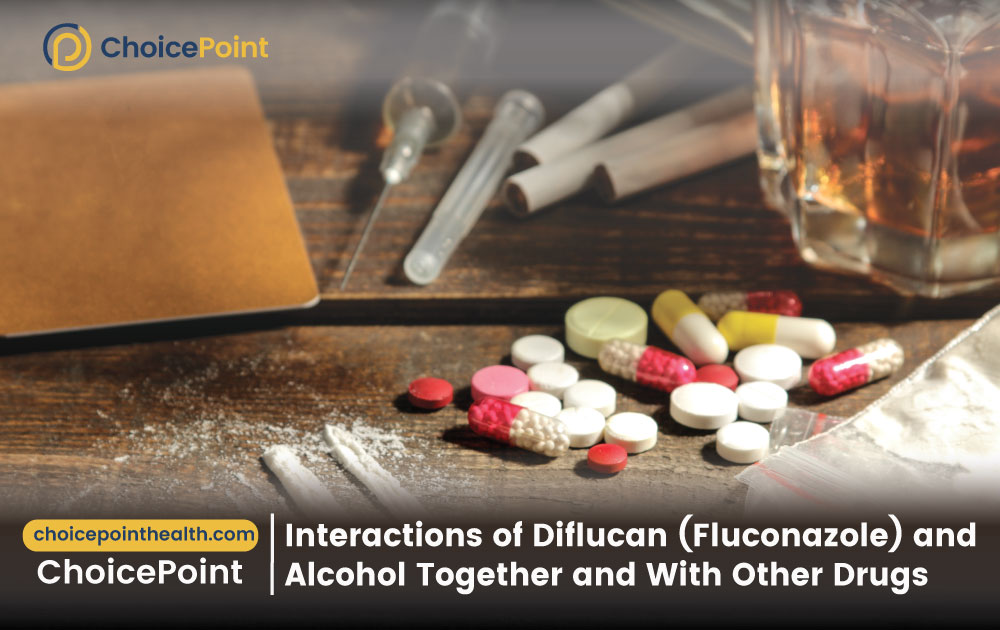Fluconazole and alcohol do not interact with each other directly. However, taking the two together is still not wise as the side effects can be aggravated, and the chances of risks increase. While some side effects of taking Diflucan and alcohol may subside, many may cause irreversible damage, especially to the liver. The indirect interactions between the two substances can render many risks. Therefore, it is very important to avoid taking the two together.
Table of Contents
Fluconazole and Alcohol Interactions with Other Drugs
Fluconazole and alcohol both have the potential to alter how other medications function in the body, raising the risk of adverse effects. Let’s delve deeper into these interactions.
Diflucan’s Interactions with Other Drugs
This is how it interacts with;
a. Warfarin
Warfarin, an anticoagulant, can be more concentrated with Diflucan, increasing the risk of bleeding. When these drugs are combined, closely monitoring the International Normalized Ratio (INR) is essential.
b. Phenytoin
Diflucan can inhibit the metabolism of the antiepileptic drug phenytoin. This can increase levels of this drug in the body, resulting in haziness, sleepiness, and other such reactions.
c. Rifampin
Rifampin is an antibiotic employed to treat tuberculosis and other respiratory infections. When taken alongside Diflucan, the concentration of rifampin can be increased. This can lead to a reduction in the effectiveness of Diflucan because it eliminates the latter as quickly at a rate of 30%.

Get Addiction Help Today!
Alcohol Interactions with Other Drugs
This is how it interacts with;
a. CNS Depressants
CNS depressants can be extremely dangerous when taken with alcohol because alcohol is a depressant. Some CNS that affect the central nervous system are:
- Benzodiazepines (such as Valium, Xanax),
- Prescription opioids (such as codeine, oxycodone)
- Sleep aids and some antidepressants
The sedative effects are amplified by alcohol. Increased sleepiness, decreased coordination, and respiratory depression may result from this combination.
Some people can be addicted to prescription medications and take alcohol for elevated effects. This can result in coma or even death. Take help from a rehab center now. Call us at 844.445.2563 or complete this form.
b. Anti-inflammatory Medicines
Alcohol use with nonsteroidal anti-inflammatory medicines (NSAIDs) like ibuprofen or naproxen can raise the risk of stomach bleeding and ulcers. If you are using any of these medicines, do not drink alcohol.
If you have a problem with alcohol, seek help. Contact us now by calling at 844.445.2563 or filling out this form to undergo our holistic AUD treatment.
c. Acetaminophen
Acetaminophen, which is frequently present in painkillers like Tylenol and alcohol, can potentially impair the liver if done so persistently. Ingesting alcohol soon after taking acetaminophen or both can raise the risk of liver injury. One of the studies shows that:
- When taken as per the doctor’s prescribed dose, acetaminophen should not cause liver damage.
- Taking it once or twice does not cause instant injuries, but NEVER take it without consulting your doctor.
Caution: Those who are the victims of alcohol addiction can be at risk of adverse reactions. You must contact your healthcare provider.
d. Anticoagulants
Alcohol and blood-thinning drugs like warfarin can interact, which raises the risk of:
- Bleeding
- Heart stroke
- Heart attack
This is especially possible if you have been a heavy drinker. The effectiveness of these drugs can be hampered by excessive alcohol use, which can cause unexpected changes in blood coagulation. Exercise caution while taking these medications.

How It Affects Pregnant Women
Ruling Out Risks Associated with Alcohol/Fluconazole Interactions
Occasionally, a person will develop a fungal infection, most of which are highly treatable. In some cases, however, it is not as simple, so we are providing ways to protect ourselves from the perils of alcohol and diflucan interactions.
1. Consult a Healthcare Professional
Get advice from a medical expert, such as a doctor or pharmacist, who knows your medical history and current drugs. This can allow you to fight off a fungal reaction safely. Also, ask before taking fluconazole and alcohol together to remain safe.
2. Avoid Alcohol During Diflucan Treatment
It is typically advised to abstain from alcohol while taking fluconazole to be safe. Alcohol may intensify the negative effects of the drug and may reduce its effectiveness. For instance, it may increase dizziness, harming you if you need to drive.
3. Follow the Dose Recommendations
Follow your doctor’s instructions for fluconazole’s recommended dosage and regimen. It is best to take the medication exactly as directed to reduce the possibility of alcohol and diflucan interactions. A clinical study shows that if a person takes the prescribed dose with an alcohol-induced injured liver, there is no adverse reaction. So, take a dose appropriately.
4. Stay Hydrated, Eat Properly
If you are on any medication, you want to stay hydrated. One of the side effects of fluconazole and alcohol include nausea and abdominal pain. This means that certain foods can worsen your nausea. To protect yourself from that, be sure to eat properly. Ask your healthcare provider what diet regimen you should follow.
5. Listen to Your Body’s Response
It is very important to observe your body’s response to any medication. If you have taken fluconazole and alcohol, paying attention to how your body has taken it becomes even more critical. If you experience nausea, drowsiness, different-colored urine, etc., put a stop to alcohol and make a call to your doctor. Some symptoms can be common, but contacting your provider is still essential.
6. Consider Alternatives
If you need to drink alcohol and fluconazole, talk to your doctor about possible substitutes. They might advise changing the course of therapy or looking into drugs that are less likely to mix badly with alcohol. If you have an alcohol use disorder, it is better to nip the problem in the bud and address it.
7. Be Open About Your History
Your doctor NEEDS to know which substances you are taking. So, for instance, if you are someone with alcohol addiction, be sure to tell your doctor so that they can prescribe a less interactive regimen. Do not hide anything, or it can be fatal for your health. Your doctor retains your confidentiality. Rather than putting your health at risk and taking fluconazole and alcohol together, consult your physician.
ChoicePoint is HIPAA compliant. We take good care of our patient’s data. If you are unsure about the degree of your addiction, feel free to use our free assessment facility. Call us at 844.445.2563 or provide the necessary information through this form.
Fluconazole and Alcohol: Wrap Up
In conclusion, due to the potential hazards and associated problems, it is advised to avoid combining fluconazole and alcohol. While there may not be direct contact between these substances, indirect interactions may be harmful, especially for the liver. Additionally, alcohol and fluconazole may interact with other drugs, raising the chance of negative side effects. Work closely with your doctor to eradicate the mentioned hazards.
Medical Disclaimer:
ChoicePoint aims to improve the quality of life for people struggling with substance use disorder and mental health issues. Our team of licensed medical professionals research, edit and review the content before publishing. However, this information is not intended to be a substitute for professional medical advice, diagnosis, or treatment. For medical advice please consult your physicians or ChoicePoint's qualified staff.









Review Interactions of Diflucan (fluconazole) and Alcohol Together and with Other Drugs.